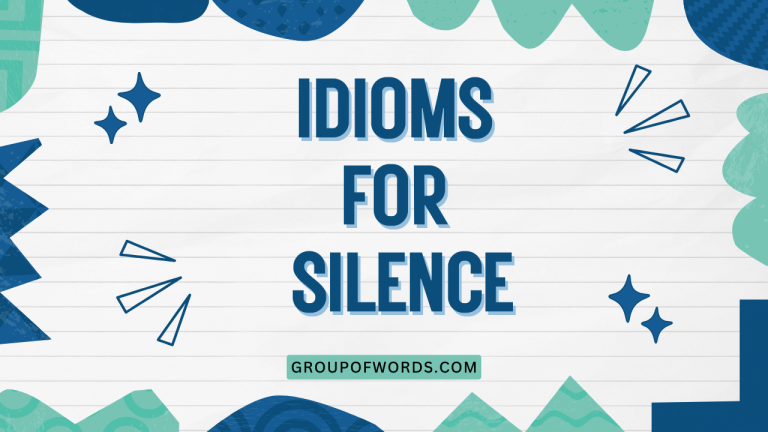Idioms for Hate: Expressing Dislike in English
Idioms are colorful expressions that add depth and nuance to the English language. They are particularly useful when expressing strong emotions, such as hate.
Understanding idioms for hate allows you to convey your feelings more vividly and comprehend the subtle cues in conversations and literature. This article explores a wide range of idioms related to hate, providing definitions, examples, and practical exercises to help you master their usage.
This guide is beneficial for English language learners, writers, and anyone looking to enhance their communication skills.
Table of Contents
- Introduction
- Definition of Idioms for Hate
- Structural Breakdown of Idioms
- Types and Categories of Idioms for Hate
- Examples of Idioms for Hate
- Usage Rules for Idioms of Hate
- Common Mistakes When Using Hate Idioms
- Practice Exercises
- Advanced Topics in Hate Idioms
- FAQ
- Conclusion
Introduction
Idioms are an integral part of the English language, enriching communication with their expressive and often figurative meanings. When it comes to expressing strong emotions like hate, idioms provide a powerful toolkit.
They allow speakers and writers to convey intensity and nuance that literal language sometimes lacks. Mastering idioms for hate not only enhances comprehension but also allows for more effective and engaging communication.
This article serves as a comprehensive guide to understanding and using these potent expressions.
Definition of Idioms for Hate
An idiom is a phrase or expression whose meaning cannot be understood from the literal meanings of its individual words. Instead, it has a figurative meaning that is known through common use.
Idioms for hate are those expressions that specifically convey strong dislike, aversion, or animosity towards something or someone. These idioms serve to amplify the expression of negative feelings, adding color and emotional depth to communication.
Idioms for hate can be classified based on the intensity of the emotion they convey. Some idioms suggest a mild dislike, while others indicate intense loathing or abhorrence.
The context in which an idiom is used often determines its precise meaning. Understanding the nuances of these expressions is essential for effective communication and interpretation.
Structural Breakdown of Idioms
Idioms often follow specific structural patterns, though these patterns are not always consistent. Many idioms are phrasal verbs, combining a verb with a preposition or adverb.
Others are fixed expressions, meaning the words and their order cannot be changed without altering the idiom’s meaning. Some idioms may contain similes or metaphors, drawing comparisons or using symbolic language to convey meaning.
For example, the idiom “can’t stand” follows a verb + verb structure, where “can’t” (contraction of cannot) modifies “stand.” The idiom “have no love for” uses a possessive verb + noun phrase to express dislike. Understanding the structural components of idioms can aid in their memorization and proper usage, even if the structure doesn’t directly reveal the idiom’s meaning.
Types and Categories of Idioms for Hate
Idioms for hate can be categorized based on the intensity and nature of the negative emotion they convey. Here are some common categories:
1. Idioms Expressing Loathing
These idioms convey intense disgust and aversion. They are used to describe a strong feeling of revulsion.
2. Idioms Expressing Detestation
These idioms indicate a profound and vehement dislike. They suggest a strong and active aversion.
3. Idioms Expressing Despisement
These idioms convey a feeling of contempt and disdain. They suggest a belief that something or someone is worthless or inferior.
4. Idioms Expressing Dislike
These idioms express a general feeling of not liking something or someone. They are less intense than idioms of loathing or detestation.
5. Idioms Expressing Abhorrence
These idioms convey a feeling of extreme repugnance or aversion; loathing. They are the strongest form of dislike, often associated with moral or ethical objections.
Examples of Idioms for Hate
This section provides a comprehensive list of idioms for hate, categorized by the intensity of the emotion they convey. Each idiom is accompanied by a definition and example sentence to illustrate its usage.
Idioms Expressing Loathing
These idioms convey an intense feeling of disgust and aversion.
The following table provides a variety of idioms expressing loathing, along with their definitions and example sentences.
| Idiom | Definition | Example Sentence |
|---|---|---|
| Can’t stand | To dislike intensely; to be unable to tolerate. | I can’t stand the smell of cigarette smoke. |
| Hate someone’s guts | To intensely dislike someone. | She hates his guts after he betrayed her trust. |
| Be sick to death of | To be extremely annoyed or bored with something. | I‘m sick to death of hearing the same excuses. |
| Rub someone the wrong way | To irritate or annoy someone. | His arrogant attitude always rubs me the wrong way. |
| Get on someone’s nerves | To irritate or annoy someone. | The constant noise is really getting on my nerves. |
| Drive someone up the wall | To irritate or annoy someone greatly. | The kids’ constant arguing is driving me up the wall. |
| Make someone’s blood boil | To make someone extremely angry or furious. | His blatant lies made my blood boil. |
| Be a thorn in someone’s side | To be a constant source of annoyance or trouble. | The unresolved issue has been a thorn in his side for years. |
| Not a fan of | To dislike something; to not be interested in something. | I’m not a fan of reality TV shows. |
| Have a bone to pick with someone | To have a grievance or complaint to discuss with someone. | I have a bone to pick with you about the missing report. |
| Loathe with every fiber of one’s being | To hate someone or something completely and intensely. | She loathed the dictator with every fiber of her being. |
| Can’t bear | To be unable to tolerate or endure something. | I can’t bear the thought of him getting away with it. |
| Detest with a passion | To hate something intensely. | He detests dishonesty with a passion. |
| Despise from the bottom of one’s heart | To hate something deeply and completely. | She despised injustice from the bottom of her heart. |
| Abhor with every inch of one’s soul | To hate something with every part of one’s being. | He abhorred violence with every inch of his soul. |
| Dislike intensely | To have a strong feeling of not liking. | I dislike intensely people who are rude to service staff. |
| Have a strong aversion to | To have a strong feeling of dislike or repugnance. | She has a strong aversion to public speaking. |
| Take a dislike to | To begin to dislike someone or something. | I took a dislike to him the moment I met him. |
| Have no patience for | To be intolerant of something or someone. | I have no patience for incompetence. |
| Hate the sight of | To dislike the appearance of someone or something. | I hate the sight of clutter in my workspace. |
| Wish someone at the bottom of the sea | To wish someone was dead or far away. | After what he did, I wish he was at the bottom of the sea. |
| Couldn’t care less | To not care at all about something. | I couldn’t care less about his opinion. |
| Turn one’s stomach | To cause someone to feel disgusted or sick. | The graphic details of the crime turned my stomach. |
| Give someone the creeps | To cause someone to feel uneasy or frightened. | That old house gives me the creeps. |
| Not touch with a ten-foot pole | To refuse to get involved with something or someone. | I wouldn’t touch that project with a ten-foot pole. |
| Make one’s skin crawl | To cause someone to feel disgusted or uneasy. | The thought of spiders makes my skin crawl. |
| Have it in for someone | To be determined to cause trouble for someone. | The boss seems to have it in for me. |
| Not give a damn | To not care at all about something | He doesn’t give a damn what others think. |
Idioms Expressing Detestation
These idioms indicate a strong and vehement dislike.
The following table provides a variety of idioms expressing detestation, along with their definitions and example sentences.
| Idiom | Definition | Example Sentence |
|---|---|---|
| Have no love for | To dislike something or someone. | I have no love for bureaucracy. |
| Be down on | To dislike or disapprove of something or someone. | The critics are down on the new movie. |
| Feel sour towards | To feel resentful or bitter towards someone. | She felt sour towards her ex-boyfriend after the breakup. |
| Hold a grudge | To harbor resentment towards someone for a past offense. | He holds a grudge against his former business partner. |
| Take exception to | To object strongly to something. | I take exception to your rude comments. |
| Disapprove of strongly | To have a strong feeling of not liking or agreeing with something. | My parents disapprove of strongly my decision to quit my job. |
| Object to vehemently | To oppose something with great force or passion. | The community objected to vehemently the construction of the new factory. |
| Take a dim view of | To disapprove of something. | The manager takes a dim view of employees arriving late. |
| Look down one’s nose at | To regard someone or something with disdain or contempt. | She looked down her nose at people who didn’t have a university degree. |
| Scorn with every breath | To despise something intensely and openly. | He scorned corruption with every breath. |
| Despise the very idea of | To hate the concept or thought of something. | I despise the very idea of animal cruelty. |
| Have no use for | To not need or want something; to dislike something. | I have no use for gossip. |
| Feel nothing but contempt for | To have a strong feeling of disdain for someone or something. | She felt nothing but contempt for his dishonesty. |
| Be repulsed by | To feel intense disgust for something. | I am repulsed by the sight of blood. |
| Be revolted by | To feel extreme disgust or revulsion for something. | He was revolted by the conditions in the factory. |
| Can’t stomach | To be unable to tolerate or accept something. | I can’t stomach the thought of him winning. |
| Find distasteful | To find something unpleasant or offensive. | I find his behavior distasteful. |
| Have a distaste for | To dislike something. | She has a distaste for modern art. |
| Be allergic to | To dislike something intensely (humorous). | I am allergic to early mornings. |
| Not be able to abide by | To be unable to tolerate or accept something. | I can’t abide by his constant complaining. |
| Hate the very ground someone walks on | To intensely dislike someone. | After his betrayal, she hated the very ground he walked on. |
| Be incensed by | To be extremely angry or indignant about something. | The community was incensed by the government’s decision. |
| Be infuriated by | To be extremely angry or enraged by something. | He was infuriated by the delay. |
| Not give a fig | To not care at all about something. | I don’t give a fig what he thinks. |
| Not worth a damn | To be worthless or of no value. | His promises are not worth a damn. |
| Have a permanent frown for | To always dislike or disapprove of something. | She has a permanent frown for anyone who disagrees with her. |
| Hold in utter disdain | To regard someone or something with complete contempt. | He holds his opponent in utter disdain. |
| Be utterly disgusted by | To feel extreme revulsion for something. | I am utterly disgusted by his behavior. |
Idioms Expressing Despisement
These idioms convey feelings of contempt and disdain.
The following table provides a variety of idioms expressing despisement, along with their definitions and example sentences.
| Idiom | Definition | Example Sentence |
|---|---|---|
| Look down on | To regard someone or something as inferior. | She looks down on people who haven’t traveled abroad. |
| Turn up one’s nose at | To reject something disdainfully. | He turned up his nose at the offer of a lower-paying job. |
| Hold in contempt | To regard someone or something as worthless or despicable. | The judge held the defendant in contempt of court. |
| Have a low opinion of | To think poorly of someone or something. | I have a low opinion of his leadership skills. |
| Think little of | To have a poor opinion of someone or something. | She thinks little of his artistic abilities. |
| Scorn the very thought of | To reject or despise an idea. | He scorns the very thought of compromising his principles. |
| Belittle with every opportunity | To make someone seem unimportant or insignificant at every chance. | He belittles her with every opportunity. |
| Disparage at any chance | To speak negatively about someone or something whenever possible. | She disparages their efforts at any chance. |
| Devalue at every corner | To diminish the worth or importance of something at every turn. | They devalue his contributions at every corner. |
| Scoff at with derision | To mock or ridicule something with contempt. | They scoffed at his ideas with derision. |
| Mock with biting sarcasm | To make fun of someone using sharp and critical irony. | He mocked her with biting sarcasm. |
| Ridicule with cruel intent | To make someone the object of unkind laughter with malicious purpose. | They ridiculed him with cruel intent. |
| Flout with open disregard | To openly disregard or defy something with contempt. | He flouts the rules with open disregard. |
| Treat with utter disrespect | To show a complete lack of respect for someone or something. | They treat their elders with utter disrespect. |
| Consider beneath one’s notice | To regard something as too unimportant to deserve attention. | He considers such petty arguments beneath his notice. |
| Deem unworthy of attention | To judge something as not deserving of consideration. | The committee deemed the proposal unworthy of attention. |
| Regard as of no consequence | To consider something as having no importance or significance. | She regards his opinions as of no consequence. |
| Dismiss with a wave of the hand | To reject something casually and dismissively. | He dismissed her concerns with a wave of the hand. |
| Relegate to the margins | To push something to the edge or periphery, treating it as unimportant. | They relegate minority views to the margins. |
| Marginalize at every opportunity | To treat someone or something as insignificant or peripheral whenever possible. | They marginalize dissenting voices at every opportunity. |
| Trivialize with ease | To make something seem less important or serious with little effort. | He trivializes serious issues with ease. |
| Make light of with casual indifference | To treat something as unimportant with a lack of concern. | They make light of environmental concerns with casual indifference. |
| Disregard with flagrant neglect | To ignore something with blatant disregard for its importance. | The company disregarded safety regulations with flagrant neglect. |
| Neglect with careless abandon | To fail to care for something properly with reckless disregard. | They neglected the historic building with careless abandon. |
| Overlook with studied indifference | To ignore something deliberately and with a show of disinterest. | He overlooked her achievements with studied indifference. |
| Eschew with vehement rejection | To deliberately avoid something with strong aversion. | They eschew violence with vehement rejection. |
| Reject with utter finality | To refuse to accept something completely and decisively. | The board rejected the proposal with utter finality. |
| Renounce with unwavering conviction | To formally reject or disown something with firm belief. | He renounced his former beliefs with unwavering conviction. |
Idioms Expressing Dislike
These idioms express a general feeling of not liking something or someone.
The following table provides a variety of idioms expressing dislike, along with their definitions and example sentences.
| Idiom | Definition | Example Sentence |
|---|---|---|
| Not be crazy about | To not like something very much. | I’m not crazy about spicy food. |
| Take a back seat to | To consider something less important than something else. | My personal life takes a back seat to my career right now. |
| Have no taste for | To dislike something. | I have no taste for reality television. |
| Be not keen on | To not be enthusiastic about something. | I’m not keen on going to the party tonight. |
| Give a wide berth to | To avoid someone or something. | I give a wide berth to that part of town. |
| Find repugnant | To find something extremely distasteful or unacceptable. | I find his actions repugnant. |
| Object to mildly | To express a slight disagreement or disapproval. | I object to mildly the noise level in this restaurant. |
| Question with reservations | To doubt or challenge something with some hesitation. | I question her motives with reservations. |
| Have misgivings about | To have doubts or concerns about something. | I have misgivings about investing in that company. |
| Feel uneasy about | To feel uncomfortable or anxious about something. | I feel uneasy about leaving the children alone. |
| Harbor doubts regarding | To have lingering uncertainties about something. | I harbor doubts regarding his sincerity. |
| Have reservations concerning | To have uncertainties or hesitations about something. | I have reservations concerning the proposed changes. |
| Be apprehensive about | To feel anxious or fearful about something. | I am apprehensive about the upcoming exam. |
| Feel lukewarm toward | To have a lack of enthusiasm or interest in something. | I feel lukewarm toward the idea of moving. |
| Show indifference to | To display a lack of interest or concern about something. | He showed indifference to her feelings. |
| Display apathy toward | To exhibit a lack of emotion or interest in something. | They display apathy toward the plight of the homeless. |
| Lack enthusiasm for | To not have a strong interest or excitement for something. | I lack enthusiasm for team sports. |
| Be unenthusiastic about | To not be excited or eager about something. | She is unenthusiastic about the prospect of a promotion. |
| Take a passive stance on | To adopt a neutral or uninvolved position regarding something. | He took a passive stance on the issue. |
| Maintain neutrality toward | To remain impartial or unbiased toward something. | The organization maintains neutrality toward the political parties. |
| Adopt a hands-off approach to | To avoid becoming actively involved or interfering in something. | The manager adopted a hands-off approach to the project. |
| Steer clear of | To avoid someone or something that is potentially problematic. | I steer clear of controversial topics at family gatherings. |
| Shy away from | To avoid something due to fear or reluctance. | He shies away from public speaking. |
| Evade with subtle maneuvers | To avoid something using skillful or indirect tactics. | She evades difficult questions with subtle maneuvers. |
| Sidestep with practiced ease | To avoid something with a smooth and practiced motion. | He sidesteps responsibility with practiced ease. |
| Circumvent with clever strategies | To find a way around something using intelligent planning. | They circumvent the regulations with clever strategies. |
| Bypass with calculated precision | To avoid something deliberately and with careful planning. | He bypassed the bureaucracy with calculated precision. |
| Skirt around with careful diplomacy | To avoid directly addressing something by talking around it. | She skirts around the sensitive issue with careful diplomacy. |
Idioms Expressing Abhorrence
These idioms convey a feeling of extreme repugnance or aversion.
The following table provides a variety of idioms expressing abhorrence, along with their definitions and example sentences.
| Idiom | Definition | Example Sentence |
|---|---|---|
| Be repelled by | To feel intense disgust or aversion. | I am repelled by the thought of eating insects. |
| Shrink from | To recoil from something in fear or disgust. | She shrinks from violence of any kind. |
| Find deeply offensive | To regard something as highly insulting or hurtful. | I find his remarks deeply offensive. |
| Consider morally reprehensible | To view something as ethically wrong and deserving of condemnation. | We consider his actions morally reprehensible. |
| Deem ethically unacceptable | To judge something as not conforming to moral standards. | The community deemed the proposal ethically unacceptable. |
| Regard as fundamentally wrong | To view something as inherently immoral or unjust. | She regards corruption as fundamentally wrong. |
| Reject on principle | To refuse to accept something based on one’s moral beliefs. | He rejected the offer on principle. |
| Denounce with moral outrage | To publicly condemn something with strong ethical indignation. | The activists denounced the policy with moral outrage. |
| Condemn with righteous fervor | To express strong disapproval of something with moral enthusiasm. | The preacher condemned sin with righteous fervor. |
| Censure with unwavering conviction | To criticize severely with firm belief in one’s judgment. | The committee censured the politician with unwavering conviction. |
| Reprove with uncompromising severity | To express disapproval sternly and without leniency. | The teacher reproved the student with uncompromising severity. |
| Disapprove with unflinching resolve | To express disapproval firmly and without hesitation. | The parents disapproved of the relationship with unflinching resolve. |
| Abominate with passionate intensity | To detest something with extreme fervor and feeling. | She abominates injustice with passionate intensity. |
| Loathe with unwavering hatred | To hate something with constant and unyielding animosity. | He loathes violence with unwavering hatred. |
| Despise with uncompromising disdain | To regard something as worthless with unyielding contempt. | They despise hypocrisy with uncompromising disdain. |
| Abhor with every fiber of one’s being | To hate something with every part of one’s nature. | He abhors cruelty with every fiber of his being. |
| Detest with every inch of one’s soul | To hate something with every part of one’s spirit. | She detests dishonesty with every inch of her soul. |
| Loathe from the depths of one’s heart | To hate something deeply and completely. | He loathes war from the depths of his heart. |
| Despise from the core of one’s existence | To hate something at the very center of one’s being. | She despises prejudice from the core of her existence. |
| Abhor with a vengeance | To hate something with intense and forceful animosity. | He abhors betrayal with a vengeance. |
| Loathe beyond measure | To hate something to an extreme and immeasurable degree. | She loathes corruption beyond measure. |
| Despise without reservation | To hate something completely and without any hesitation. | He despises arrogance without reservation. |
| Abhor without exception | To hate something in every instance and without any exceptions. | She abhors violence without exception. |
| Find utterly abhorrent | To regard something as completely repugnant and detestable. | I find child abuse utterly abhorrent. |
| Consider deeply repugnant | To view something as profoundly offensive and repulsive. | They consider animal cruelty deeply repugnant. |
| Deem morally indefensible | To judge something as ethically unjustifiable. | The community deemed the actions morally indefensible. |
| Regard as ethically unacceptable | To view something as not conforming to moral standards. | The committee regarded the proposal as ethically unacceptable. |
| Reject on moral grounds | To refuse to accept something because it violates one’s moral principles. | He rejected the offer on moral grounds. |
Usage Rules for Idioms of Hate
Using idioms correctly involves understanding their context, connotation, and grammatical structure. Here are some rules to consider:
- Context is Key: The meaning of an idiom can change based on context. Always consider the situation and audience when using idioms.
- Know Your Audience: Some idioms are informal and may not be appropriate for formal settings. Consider your audience’s familiarity with idioms.
- Grammatical Structure: Many idioms have a fixed structure. Changing the words or their order can alter the meaning or make the idiom nonsensical.
- Intensity: Be mindful of the intensity of the idiom. Some idioms express mild dislike, while others convey strong loathing.
- Cultural Sensitivity: Some idioms may have cultural or regional variations. Be aware of these differences to avoid misunderstandings.
Rule: Always consider the context and audience when using idioms for hate. Using a strong idiom in a mild situation can sound exaggerated or insincere.
Example: Instead of saying “I loathe the new policy” (strong dislike), you might say “I’m not a fan of the new policy” (mild dislike) in a professional setting.
Common Mistakes When Using Hate Idioms
Misusing idioms can lead to confusion or miscommunication. Here are some common mistakes to avoid:
- Literal Interpretation: Avoid interpreting idioms literally. Their figurative meanings are different from the sum of their individual words.
- Incorrect Word Order: Many idioms have a fixed structure. Changing the word order can make the idiom nonsensical. For example, saying “The wrong way rubs me” instead of “Rubs me the wrong way.”
- Using the Wrong Idiom: Choose idioms that accurately reflect the intensity of your feelings. Using an idiom that is too strong or too weak can misrepresent your emotions.
- Overusing Idioms: While idioms can add color to your language, overusing them can make your speech sound unnatural or contrived.
- Mixing Idioms: Avoid combining parts of different idioms. This can create a confusing and nonsensical expression.
Note: Pay attention to the correct word order and structure of idioms. Incorrect usage can change the meaning or make the idiom incomprehensible.
Practice Exercises
Test your understanding of idioms for hate with these exercises.
Exercise 1: Fill in the Blanks
Choose the correct idiom from the list to complete each sentence.
- I __________ people who are rude to waiters. (can’t stand, have no love for, take a dim view of)
- He __________ the new regulations. (hates the sight of, feels sour towards, objects to vehemently)
- She __________ his constant complaining. (is sick to death of, turns up her nose at, has a low opinion of)
Answers:
- I can’t stand people who are rude to waiters.
- He objects to vehemently the new regulations.
- She is sick to death of his constant complaining.
Exercise 2: Matching
Match the idiom with its correct definition.
- Have a bone to pick with someone
- Make someone’s blood boil
- Not a fan of
Definitions:
- [ ] To dislike something.
- [ ] To make someone extremely angry.
- [ ] To have a grievance to discuss with someone.
Answers:
- Have a bone to pick with someone – [ 3 ] To have a grievance to discuss with someone.
- Make someone’s blood boil – [ 2 ] To make someone extremely angry.
- Not a fan of – [ 1 ] To dislike something.
Exercise 3: Correct the Mistake
Identify and correct the mistake in each sentence.
- His attitude rubs me in the wrong way.
- I am not loved for bureaucracy.
- She has a low opinion on his leadership skills.
Answers:
- Correct: His attitude rubs me the wrong way. (Mistake: “in” should be “the”)
- Correct: I have no love for bureaucracy. (Mistake: “am not loved” should be “have no love”)
- Correct: She has a low opinion of his leadership skills. (Mistake: “on” should be “of”)
Advanced Topics in Hate Idioms
For advanced learners, exploring the nuances and origins of idioms can provide deeper insights. Some advanced topics include:
- Etymology: Understanding the historical roots of idioms can shed light on their meanings and cultural significance.
- Regional Variations: Idioms can vary by region. Learning these variations can improve communication with diverse groups.
- Literary Usage: Analyzing how idioms are used in literature can enhance comprehension and appreciation of texts.
- Translation Challenges: Idioms often pose challenges in translation due to their cultural specificity and figurative meanings.
FAQ
What is the difference between an idiom and a proverb?
An idiom is a phrase with a figurative meaning, while a proverb is a short saying that expresses a general truth or piece of advice.
How can I improve my understanding of idioms?
Read widely, pay attention to context, and practice using idioms in your own speech and writing.
Are idioms for hate always negative?
Yes, idioms for hate are inherently negative as they express dislike, aversion, or animosity.
Can idioms for hate be used humorously?
Yes, in certain contexts, idioms for hate can be used humorously to express mild annoyance or sarcasm.
Conclusion
Mastering idioms for hate enhances your ability to express and understand strong emotions in English. By understanding the definitions, usage rules, and common mistakes associated with these expressions, you can communicate more effectively and vividly.
Continue practicing and exploring these colorful phrases to enrich your language skills and cultural understanding. Whether you’re expressing mild dislike or intense loathing, idioms provide a valuable tool for conveying your feelings with precision and impact.






